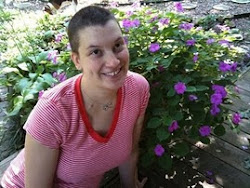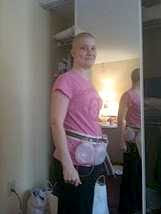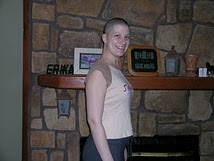
Recently, Angelina Joli made a big splash in entertainment news as she wrote about her prophylactic bilateral mastectomy. She and I share family history of relatively young women being stricken with this beast to the point of death. Luckily for her, she was able to act pre-emptively instead of finding herself in an oncologist's office hearing the dreaded "You have cancer". In addition to sharing a family history, we also share a mutation in our BRCA1 genes that makes us at least 85% more likely to develop the dreaded disease. Our mothers were also both diagnosed as relatively young women (my mother was 48, Joli's mother was in her 50s I think). My mother survived, while Joli's succumbed to the disease. Other breast cancer survivors in the entertainment industry have come out with their stories as well, but Joli's struck closer to home for me for some reason. Perhaps it's the BRCA1 connection or perhaps it's that I now have more time to think about what's going on in the world. For whatever reason, I am exquisitely aware of the controversy her decision has sparked. In my expanded world of social networking sites, I have many devout Catholics and Christians that I respect and have supported me throughout my trial. However, instances like Joli's announcement sometime reveal more about how people view the decisions I made as a result of my diagnosis.
You see, while I was diagnosed with an active cancer, it was self contained and only on my left side. In other words, the excisional biopsy for diagnosis could have been the final surgery for my cancer. After all, the tumor was removed in its entirety and chances were good it had not spread to my lymph nodes. Yet, due to my genetic predisposition and more than a little bit of fear, I not only chose to remove my entire left breast, but also my healthy right breast and both ovaries (since BRCA1 increases the risk of ovarian cancer by 40%). In the medical community of MD Anderson, there was no real discussion of only having a lumpectomy. It was mentioned as a possibility, but for very different circumstances. My thoughts were to similar to the tongue-in-cheek slogan, "Yes, they're fake, but my real breasts were trying to kill me." During the acute phase of my treatment I was very active in a community of other women genetically predisposed to breast cancer. Some of them, like Joli, chose to remove their breasts before they could become diseased. I must admit that the stories of women as young as 20 having this major surgery shocked me, but not as much as the women who chose a simple lumpectomy or only alternative treatment for their disease. I couldn't imagine having this sometimes fatal disease, but not throwing every treatment possible at it. The risk of reoccurrence for BRCA1 breast (and most of the other genetic forms of breast cancer) are significant. Yet, as a contemplative and respectful person, I recognized that this decision was very personal and must not be taken for granted.
In light of Joli's announcement, some expressed their belief that her decision was too drastic. It was speculated that changes in diet, full-term pregnancies at a relatively early age, breast feeding, and other lifestyle choices were sufficient. One even commented that Joli's decision displayed a lack of faith in God and too much in science. Again, while my situation differed from Joli's, I couldn't help but apply these sentiments to my decision. My full-term pregnancies were in my mid-twenties, but were both preceded with two miscarriages each. As my readers know, my sixth pregnancy preceded my diagnosis by only 20 weeks. Additionally, I have never been a huge fan of red meat, but enjoy broccoli and other foods known to be good for decreasing risk. Simon, my oldest, nursed for a year, only stopping when he chose, on his first birthday. None of those choices had prevented my cancer at 28, so I've since found that while these choices won't hurt, they obviously don't guarantee the absence of breast cancer.
Prior to this major decision (my oophorectomy), I spent a lot of time in prayer and conversation with trusted Catholic priests, doctors, and theologians in addition to scouring scientific journals. Respected and learned doctors recommended oophorectomy between the ages of 35 and 40, several years away for me, but conceded that in my situation (my young age and pregnancy at diagnosis and the concerning factor of my miscarriages & gynecological issues), the choice was with merit. Deciding to sacrifice my ovaries also obviously sacrificed my fertility, even though I had wanted at least one more child. Conversely, removing my ovaries would also eliminate my suffering with severe endometriosis and poly-cystic ovarian syndrome. Because of these secondary issues, I consulted the Pope Paul VI Institute's Dr. Hilgers to determine if he'd found, through NaPRo Technology and his Creighton Model research, any bio-markers to detect ovarian cancer through charting. After all these prayers, conversations, and research, I made my choice to have the oophorectomy.
While I am comfortable and at peace with my decisions, a small part of me is wounded when those I respect indicate my choices were extreme or a matter of placing more trust in science than in God. Sometimes I also suffer from baby envy as my friends excitedly tell the world of their pregnancies. Other times, when it is assumed there are better alternatives--especially from people who've not faced my situation--that I didn't investigate, I feel as if I've been slapped. Most people are ignorant of not only the horror of realizing you have cancer, facing chemotherapy and surgery, and the constant anxiety of a recurrence. Those that are compassionate, after hearing my reasoning and the statistic behind my choice, concede that in my position they likely would have made the same choice. Many are immediately swayed by my explanation that I chose to reduce my risk through removal of 'healthy' organs, not out of fear of death, but to live for my children. These are the people who do not hurt me by their opinions because they are mature and compassionate enough to realize how much thought, research, and prayer went into the decision. Yet, there are some who steadfastly refuse to be compassionate and insist, even in my situation, they would not make this "sinful" decision. Unchristian is not often a term I apply to others, but it seems applicable. I think these people are confusing prophylactic surgery with prophylactics (condoms and diaphragms). The former, and only the former, are considered moral. As a matter of fact, I'm hard pressed to find any Catholic moral theologian who disagrees with prophylactic surgeries to prevent cancer--even if fertility is sacrificed. With this in mind, I pray for those misguided souls, not simply because they hurt my feelings, but for God to preserve them from being faced with the same decision I was. Perhaps one day, God will grant science a less invasive means to prevent cancer, but until then, I trust Him to guide those who ask into the right approach for them.
Here are some resources to learn more about BRCA1 and BRCA2 Breast and Ovarian Cancers.
MD Anderson research slide show - http://www.mdanderson.org/education-and-research/departments-programs-and-labs/programs-centers-institutes/blanton-davis-ocrp/noah-kauff-hereditary-ovarian-cancer.pdf
National Cancer Institute Hereditary Breast and Ovarian Cancer facts - http://www.cancer.gov/cancertopics/pdq/genetics/breast-and-ovarian/healthprofessional
Aetna Health Insurance Policy information - http://www.aetna.com/cpb/medical/data/200_299/0227.html
MedScape information (my doctor, Jennifer Litton) is quoted - http://www.medscape.com/viewarticle/589280
Journal of Clinical Oncology article on Risk Reduction in BRCA1/2 - http://www.ncbi.nlm.nih.gov/pmc/articles/PMC2815712/



